The story of Brian Kelly at Notre Dame is one of steady improvement. His success wasn’t instant, with close-game struggles and a 4-5 start in Year 1 and the most frustrating possible 0-2 start in Year 2. There were dramatic swings here and there – the breakthrough in 2012 few saw coming, and the collapse in 2016 that was equally surprising.
But over more than a decade, it’s been defined by slow and, relative to the chaos of college football, steady progress. After underachieving relative to the Irish’s talent in the Weis years, Kelly brought stability and competence, then leveraged his early success into job security and additional investment in the program. Even in his last years in South Bend, he still had his eye on the next incremental improvements – how could the Irish climb a few more notches in recruiting? How do you upgrade when Clark Lea leaves for his alma mater? Could he twist Jack Swarbrick’s arm for more facility upgrades, or add additional scouting and recruiting staff?
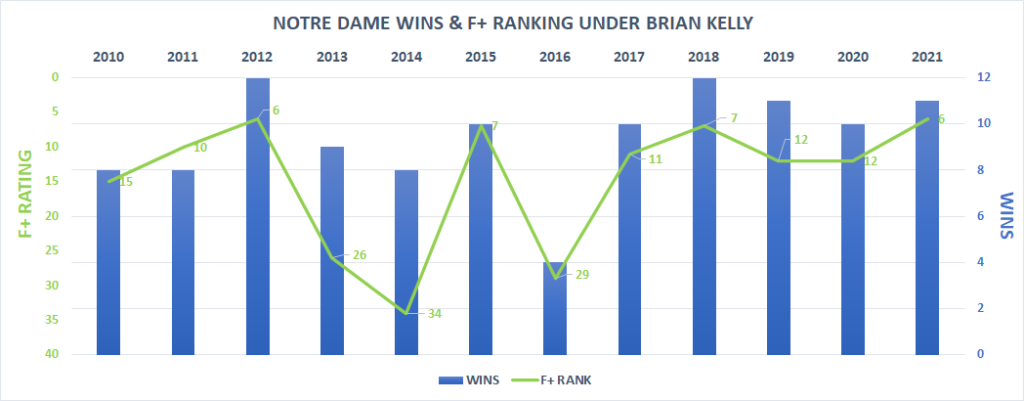
Would Kelly’s stepwise approach and slow upward trajectory eventually take Notre Dame to the promised land? Probably not, but his reputation is slightly tarnished by his choice to leave for a purportedly easier route to a championship rather than answer that question. His departure for LSU with the Irish alive in the playoff hunt is a tacit admission that Kelly didn’t believe he could make that final leap in his last chapter.
Oustanding development, strong hiring decisions, but limitations as a recruiter held Kelly back from the final step
It’s hard to write Kelly’s obituary with a better summary than his own words – “the best Notre Dame coach that’s never won a championship”. The timing of his departure is strange since appreciation for his work at Notre Dame may be at an all-time high on the heels of five straight 10+ win seasons. The 2021 season stands as one of Kelly’s best, hiring Freeman to form a duo of up-and-coming coordinators and enhance recruiting, navigating roster upheaval and quarterback decisions to still finish 11-1. It’s easy to take for granted his sheer organizational competence and experience, which largely goes unnoticed but has translated into an elite recent record at home and against unranked opponents. It’s also striking as you look at the programs like USC, Texas, and Florida that have cycled through coaches who struggle to win consistently with massive resource and talent advantages.
The same holds for Kelly’s player development and scouting track record, which has been incredibly strong and consistent over his tenure. Producing early-round NFL draft picks seems like a given at Notre Dame, yet it was an area where Kelly’s predecessors struggled. BK’s eye for coaching talent was mostly excellent, with the notable exception of the Van Gorder hire that nearly torpedoed his career. Still, there were inspired acquisitions and promotions like Bob Diaco, Matt LaFleur, Mike Elko, Clark Lea, and finally Marcus Freeman and Tommy Rees. Even some imperfect hires like Mike Sanford appeared to be solid assessments at the time, and there were far more hits than misses.
It’s interesting that ultimately Kelly evolved into much more of a CEO-style coach after arriving with a reputation for engineering dynamic offenses at Cincinnati and Central Michigan. Looking back on Kelly’s tenure, his teams lack a distinct identity, or at least one that feels more closely tied to BK than Notre Dame. His best teams featured elite offensive lines and strong defenses, with a dual-threat quarterback and enough skill position talent to build good but rarely elite offense. He could (and did) win multiple ways – not with pure dominance on either side of the ball, but building rosters with few weaknesses and high floors in each phase of the game.
What held Kelly back from a breakthrough? Bumping into his recruiting ceiling and failing to find and develop an elite quarterback. Despite all of the 10+ win seasons, Notre Dame usually still finished ranked in the 5-15 range in F+ versus fielding truly dominant teams. That’s likely a result of recruiting limitations, where it seems fair to call Kelly a “B”-level recruiter as head coach. It’s not a coincidence the stars never quite aligned with skill talent, lines, and defense all great at once – they simply didn’t recruit at a high enough level to ensure that continuity and star power across the board. The Irish consistently landed top 10-12 ranked classes and evaluated well enough to achieve slightly better than that in a few years. But the lack of top-end recruiting left little margin for error or hope for a title run, especially in the playoff era where Notre Dame would likely need to beat two more talented teams back-to-back.
This relative weakness is why claims that Kelly was bumping into Notre Dame’s ceiling of performance in the modern era don’t hold up. You can’t claim it’s nearly impossible to perform better in this job in one breath yet expect Marcus Freeman to provide a significant boost in recruiting in the next. While it’s true that finding that combination of recruiting ability and leadership paired with the eye for coaching talent and player development is exceedingly rare, it’s not impossible.
Stability and competence right away
The Brian Kelly hire is a memorable one for me. I was a student for the joyous 2006-2009 seasons of the Weis era, covering his final fall for The Observer. I was in Palo Alto when Weis no-showed the press conference after losing to Stanford. I remember trying to write a finals essay and getting the email that it had finally happened, then pulling close to an all-nighter putting a special edition of the paper together with instant reaction and candidates with Kelly in our top tier with Bob Stoops. As the process dragged on I wrote an editorial that at some point this better end with BK, otherwise the process had been botched. I was assigned to cover his introductory press conference but went out to bars the night before and slept through it (it was fine, those transcripts were all online anyway).

Kelly inherited decent talent that had struggled to achieve and fell apart over the last months of 2009. The end of the Weis era (2007-2009) saw Notre Dame finish 78th, 46th, and 34th in F+. The 6-6 finish with an easy schedule and offense loaded with NFL talent in 2009 was the last straw, and many key pieces departed in the coaching transition. Still, Notre Dame improved to a top-20 level in Kelly’s first year and by Year 2 Kelly was fielding top-20 caliber units on both sides of the ball. The Irish played far too many close games and underperformed in the win column as a result, but very quickly BK established a far higher floor than his predecessors. In 2012, the close-game luck swung the other way and the Irish came tantalizingly close to a title (Baylor, why did you have to beat K-State?) for the first time in ages.
Looking back, a significant dip before the 2016 reboot
The 2013-2016 seasons are most remembered from the bottom falling out in 2016, but this was a phase was a stretch that included 3 of Kelly’s 4 worst seasons by F+ rating (2013, 2014, 2016) with the brilliant 2015 effort in between. A lot went wrong off the field in this stretch, with a string of events from Te’o’s catfishing scandal to Golson’s academic suspension and the Frozen Five.
In 2013 Golson’s absence cast a pall over the year before it started, and the Irish underachieved even considering his absence (26th in F+). The 2014 season started brilliantly despite the “Frozen Five” scandal, then fell apart at the seams with a shady call in FSU followed by the defense wrecked by injuries, late coaching blunders, and Golson’s unraveling in an embarrassing November. The following fall would be one of Kelly’s most talented teams and better coaching jobs as the injury bug hit hard again, with the Irish falling just short of a playoff berth with two close losses to top teams.
2016 hardly needs to be revisited, but in hindsight, it was probably a blessing to both Kelly and Notre Dame that they blew as many close games as possible to land at 4-8. The team quality was similar to previous 8-win teams, and without the misery, I’m not convinced Kelly takes a step back and overhauls his staff and program in the ways we now know were necessary.
BK 2.0 – A revival brings consistent winning and ND to the top of the 2nd tier
It’s been an incredible run of double-digit win seasons and playoff contention. As Texas, USC, Michigan, and a host of other programs have shown, winning consistently even as a top-tier program is incredibly difficult. The winning streaks at home and over unranked opponents flash Kelly’s best organizational traits coming through. Whether looking at winning percentage or advanced stats, Notre Dame has clearly been the 5th or 6th best program in this stretch.
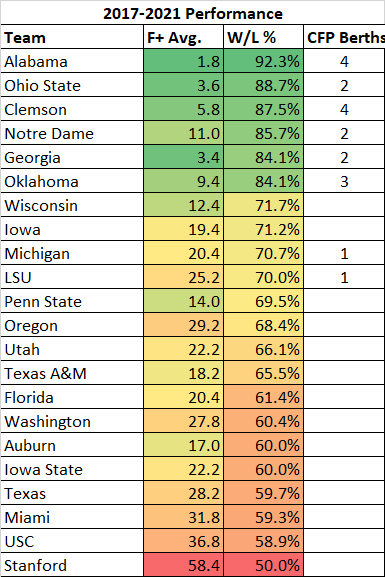
It also required some strokes of luck. USC wandering in the wilderness for most of this decade was a gift. The 2018 and 2020 schedules each opened up beautifully to enable undefeated regular seasons. The 2021 season was similar, with half of a looming murderer’s row of opponents in turmoil; USC fired Clay Helton, UNC failed to surround Sam Howell with defense and enough weapons, Graham Mertz spun in a mid-career crisis, and the Fuente era at Virginia Tech was hanging on by a thread. The Irish went an astounding 14-2 in one-score games over the past five seasons – a sign of strong coaching but also bounces going the right way.
The only flaw in this run was the lack of consistent performance against similar or more talented teams. Even prior to the “2.0” years, Kelly teams competed well but fell short of massive wins against Florida State (2014), Clemson (2015), and the best Stanford teams from early in the decade. That trend continued with two near-misses against Georgia in 2017 and 2019. Even more troubling than those losses were the inexplicable blowout defeats at Miami and Michigan. The playoff losses to Clemson and Alabama were overblown considering the strength of those eventual title-winners, but seeing the Irish take more chances and compete better in those matchups would have helped given Kelly’s history of big-game shortcomings.
Setting the table for the next chapter
Over Kelly’s 12 years and the course of multiple contract extensions, he’s constantly made upgrades to Notre Dame’s program resources. It’s incredible to think about the state of the program in 2010 – no training table, massive overhauls needed in strength and conditioning, practice, and team facilities that were already outdated in the college football arms race. Salaries for assistants have increased to competitive levels where Marcus Freeman can choose the Irish offer over LSU (oh, the irony now). The recruiting and analyst staff will never be Alabama, but Kelly has added off-field scouting and recruiting headcount too.
The Campus Crossroads renovations brought field turf, a new locker room, and an improved stadium experience. Kelly doesn’t deserve credit for 100% of those decisions, but the new indoor practice facility is practically a prerequisite for a playoff-caliber program, and he consistently pushed for upgrades and resources to keep momentum. Kelly inherited a program from Weis that was a consistent underperformer with significant talent holes, and the next coach will walk into a thriving program loaded with talent, depth, and resources.
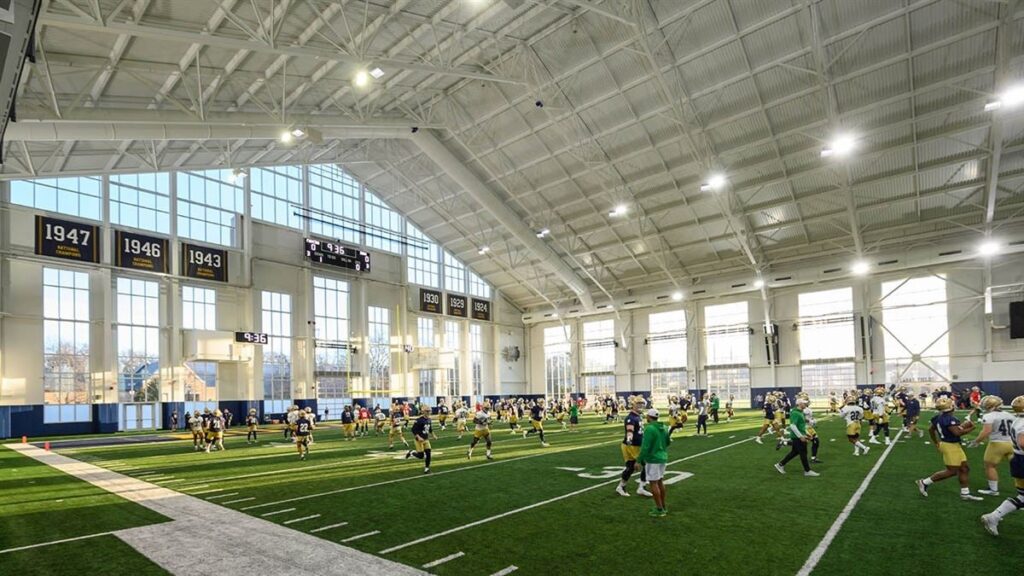
In a strange way, the performance of Marcus Freeman will cement the final chapter of BK’s legacy. If Freeman is able to make the playoff more consistently, or God-willing, win one, it will feel in some ways like the culmination of a journey Kelly started, especially since BK brought Freeman to South Bend. There will correctly be credit for being able to take the leap that Kelly couldn’t, but some necessary acknowledgment of the foundation Kelly laid to enable this (especially if BK recruits figure prominently in the efforts). If Freeman struggles, it will reinforce just how difficult this job is and put Kelly’s performance again in a favorable light as the only successful coach in a litany of post-Holtz failures.
Of course, the other variable is how the Massachusetts native performs in Baton Rouge. If Kelly can become the 4th straight LSU coach to win a national championship, he solidifies his standing as one of the best coaches of this era. But if he struggles to win as consistently in the SEC – and especially if there’s an implosion – it will further emphasize his relative limitations

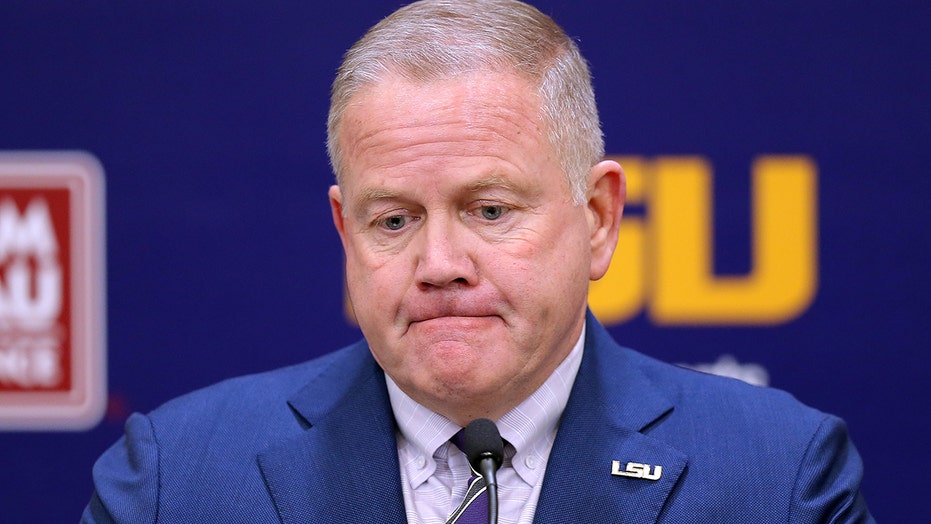
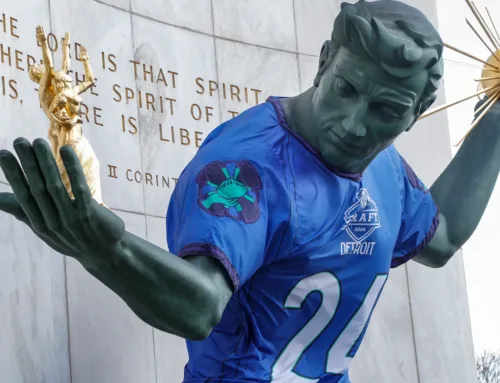
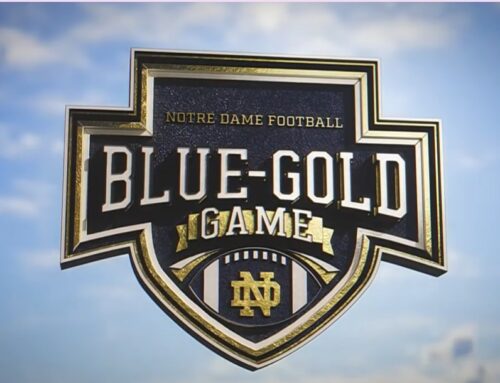

Regarding Kelly’s recruiting ceiling vs. Notre Dame’s ceiling, it stands out to me that Weis was able to recruit at least as well as Kelly if not better, including the #2 class following an absolutely abysmal 2007 season, one flanked by Alabama and Miami per 247 while having nine fewer players. Kelly did a lot of good, especially in his 2.0 CEO phase, but I think his lack of peak on the recruiting trail kept us from hitting Notre Dame’s full potential. If Weis can get classes that good or better after 10-15 years of wandering the wilderness, including his own ineptitude, I don’t see why we shouldn’t be able to do it now.
In fairness, the “Weis got the #2 class” thing elides that recruiting has gotten even more top-heavy in the intervening 15 years. Based on 247 scores, that highest-ranked Weis class would have only been the #2 class once since 2010, and in many cases would have been the #4 or #5 class (and in most cases is not particularly close to the #1 class).
Still, to your point: there’s no reason to believe it should be impossible to recruit at a top ~5-7 level consistently with the program performing as a top-~5-7 program. I guess we’re about to find out!
Even a #4 or #5 class would be a lot better than all but one of Kelly’s recruiting classes in the past 12 years. Other than the 2013 class, we were never even in the top 10.
I think the fact that we’re poised to have a #4 class this year already demonstrates Freeman’s effect. I think he’ll definitely bring recruiting to another level. The question will then be what he can do with that increased talent pool.
Yes and no. Weis was good at landing elite offensive skill position talent but was pretty bad at putting any kind of cohesive roster management strategy together.
For example, the top four recruits per year under him:
11 out of 16 were offensive skill guys. It’s good to get them, obviously, but that needs to be more even. Weis was particularly weak at recruiting OL and back seven, and not surprisingly that came back to bite him in the end.
Kelly I think was pretty good at roster planning and pretty clearly hit or miss on landing elite talent. I’m hopeful that Freeman can put both pieces of that together.
Looks to me like Wei’s was pretty hit and miss as well. I’d say about half his top guys shown were pretty meh.
This was a great post-mortem of the Kelly era – nice work!
I’ll add one point: people mad at him for leaving last week should ask if they would be happier if he left this week. I suppose there is an argument for that (we’re officially out of the playoff now), but also ND is unquestionably in a *better* position that he left 9 days ago and not 2 days ago.
with early signing day 99% of transitions from one program to another are going to be gutting, it’s just a scale of being somewhat screwed to irreparably screwed. You are right that the timing could have been worse, but ND was incredibly fortunate to have a guy to minimize the damage, but I think the criticism is valid, everyone would rightfully be pissed either way but leaving with real playoff hopes alive is incredibly selfish.
I wouldn’t have turned the job down on a playoff “maybe”, and once the leak happened his hand was forced anyway.
This was a really good, and fair, write-up of BK’s time as coach. I will always appreciate the fact that he brought ND back from the Davie-Willingham-Weis mediocrity. His organization and program building skills seemed to be mostly behind the scenes, so he might not get enough credit for his work in that area. It’s amazing how much the fist-pumping BVG brought down the team in the middle years, but overall BK did a great job…too bad he could not get ND over the hump.
I was upset when he left the way that he did, but I really do appreciate his job as coach for the past decade.
We paid BK for all 12 years of work he did, we weren’t accruing an ever growing debt to him. Then, when he left, he did his best to burn the program down to his personal benefit going forward. He lied to recruits, put assistants in position where they lied to recruits, spent hours trying to poach staff without informing the program he left, left two weeks before ESD, one week before CFP announcement.
I don’t owe him some kind of wergild for only paying him 70 million dollars for turning around the football program. “Other coaches do it” isn’t a reason to forgive him either, and other programs don’t forgive their former coaches for sticking the knife in their back on the way out, unless you’re telling me I missed the announcement of the Lincoln Riley Memorial statue garden down in Oklahoma or Tennessee fans are crowd sourcing a shrine to Lane Kiffin I haven’t heard about. Kelly is welcome to the same legacy they receive, which is to say a mixture of temporary animosity and ultimately indifference.
Kelly is gone, and we’re moving forward without him. I wish him absolutely no future successes and am petitioning no one to have mercy on his soul.
yeah i dont think there’s any debt at all or argument that any ND fan should wish good things for him or forgive. also, very nice use of wergild.
i don’t think ultimately there will be indifference as more time passes, there will just be sects of the fanbase that still harbor animosity and some that soften to something like appreciation (which you could have for the accomplishments without any love for the guy or way he left). how big those pieces of the pie are probably depends on what comes next.
I think there’s a bit of a sliding scale regarding how much credit Kelly deserves for Notre Dame following trends in college football, and I’m not on the extreme appreciative end. Other than not crediting Kelly as much for some program-level improvements during his tenure I agree with your Kelly post-mortem.
I think you’ll be surprised how quickly the indifferent piece of the pie grows once Kelly is retired. I spend very little time thinking about Terry Brennan, for instance, and he didn’t cause negative waves when he left.
Brennan also didn’t win very often. Big difference IMO.
All a part of the game, yo. I don’t have a problem with anyone feeling all sorts of ways to Kelly, you’re entitled to do that as you please.
After emotion settles, I don’t think Kelly did anything terribly wrong though. He was the Notre Dame coach and acted accordingly up until the moment he wasn’t the ND coach.
Is it a little skeezy he denied the reports to Merriweather after leaving his house? Sure, I’m not dying on the hill for him by any means, but that’s largely college football today. His job and duty was to go recruit, so he was doing it right up until the point it wasn’t his job.
Coaches try to keep good assistants that they like. Kelly was trying to “poach” Freeman, but Kelly was also the driving reason why Freeman was at Notre Dame in the first place, so I’d put that into the context of the picture too.
Oklahoma fans can feel free to hate on Riley, but I think they’re just saying the quiet part out-loud when they bemoan and deal with the fact that he is as a coach better and is in a higher station than their program. He is the reason that so many 5 stars were going there, and they left with him. I can see why they’re mad, but they’re mad because of their insecurities and because he did damage to them. He out-grew them and left them for better.
I think ND and Brian Kelly are the exact opposite. He built the team up, got to his ceiling and then left the program in a good place. The program could be better off without him in some ways. So I don’t have much animosity towards him. Weird timing and a shocking move, but go get your money while you can. Kelly made a business move that was right for him, and I don’t really think he did anything out-of-line, including trying to get his best assistants to leave as well. That’s just major college football.
(That said, can we get like some enforceable contracts or something on ANYONE!?! Why even have a contract?!?)
One inexplicably unreported aspect of this story is whether LSU had to pay ND a buyout
I remember distinctly that Fortuna said on one of the recent Shamrocks that LSU did pay a buyout and it was “in the $5 million range”. But I don’t think I’ve seen it anywhere else.
I assume they will be distributing this to alums?
STHs, please. They never did process a refund for the 2016 season.
They could send us all like $10, no? That would be funny. Alternatively, it would be kind of sweet if they named a bathroom or toilet in the Gug Renovation the “Brian Kelly Buyout Memorial Bathroom”.
DPAC presents: Blazin’ Sea Nuggets: The Musical
Just spend the entire buyout to bring back Stuffing the Passer.
An Oklahoma state senator introduced a bill to name the last three inches of the state’s “most desolate highway,” just before you leave the west end of the panhandle, the Lincoln Riley Memorial Highway. He said he’ll cover the cost of the sign himself.
Petty, and pretty funny.
I will gladly donate my share to the Get Rid of the Shrieky Irish Lady Kickoff Song Fund.
I’ve been surprised that hasn’t been said, either (though I’ll take Hooks’ word for it about the Fortuna mention). I’m actually a bit surprised there was a ‘coach leaves himself’ buyout – Jimbo Fisher notably does not have one at Texas A&M – but I imagine the Kelly and Riley moves in particular have all but ensured even the most desirable jobs will put such provisions in going forward.
Ultimately I agree with you — this is a nasty business with life-changing, generational wealth on the table. Of course coaches are going to be mercenaries. This is one of the many reasons you don’t hire a coach to be your friend. But Kelly seems to have a particular knack for leaving his teams in the lurch with just the worst optics possible.
That said, it’s funny to watch non-ND fans go, “Man, I hated ND, but now that Kelly is gone and Freeman is the coach, I kinda like ND!”
Who was it that you actually hated all along?
Really, he was *trying* to *burn down* the program? That seems like a pretty emotional take.
And now that I read it, Hooks’ take is the right one here.
Just a PSA, the abusive relationship hotline is available 24/7 at 800.799.SAFE (7233) if anyone knows people who might need it.
Case and point.
It’s possible to affirm he did not sketchy things without affirming that he was trying to burn down the program.
‘Tis the season, made me think of Brian Kelly cleaning out the Gug like the Grinch slinking around on Christmas Eve:
haha!
btw I meant he *did* sketchy things.
There once was a coach named Kelly
Whose patois was strange, I’ll tell ye:
From Massachusetts?
Just ax’ –he’ll lose its—
That faux Irish c(eaux)ch so smelly.
Wow. So you would have turned that kind of opportunity down?
You might as well let it go. We have no guarantee Freeman wouldn’t do the same thing if he’s successful. Or even that he will be successful.
We’ll see. I remember this fan base being overjoyed at the Willingham, Weis, and Kelly hires. Even the Van Gorder hire for a bit.
We have a new HC who was an assistant here for one season, with no head coaching experience. That’s never worked here before, maybe it will this time.
Meanwhile ND’s self imposed recruiting limitations, including the undergrad transfer portal, will continue to be an anchor around The head coach’s neck.
The formula for a CFB championship is centered in an elite QB coupled with an elite receiver corps. That’s the ante to get into the game, plus a very strong supporting cast on both sides of the ball. Without that core of QB and receivers, no chance of winning it all. Bama may well repeat this year as it’s the only team in the playoff with that core.
We need to be able to recruit the best of the best at those positions and that’s been the glaring shortfall at ND. I don’t think that changes unless the administration lightens up on some things.
First, I will always appreciate what Kelly did for ND. We were truly a shambles when he was hired and he turned that around. That point seems unassailable.
I have been a Kelly defender from the beginning. At the time he took over, we were NOT considered a top-flight program anymore, nor were we considered a necessarily top-level job for a head coach (thanks, Urban Meyer, you prick). His careful and gradual building back the program reversed all those tendencies to the point that ND is now probably considered among “the best of the rest”, after excluding about 3 teams (notice I say “teams” rather than “schools” because I doubt that much of anything academic goes on at those places).
My defense of Kelly was always; “who you going to get that’s as good as him?” Clearly that argument started to look less compelling these last few years and I wonder what Luke Fickell would have done had his defensive coordinator not ended up at ND. Still, I don’t think Kelly could have been fired from his post by ND, short of some major scandal.
My quarrel with Kelly now is that he really left us in the lurch. Sure, it’s the nature of college football to have this sort of thing happen, but we’re supposed to be different. Who knew that Marcus Freeman (and let’s not forget that some of us, including me, were not happy with him earlier in the season) would become so beloved by the team and the other assistants?
But let’s not think that Kelly left because he thought he had a better chance at a National Championship at LSU. I suppose that’s a possible part of his thought process. But, let’s assume LSU offers him only a 10% raise over his current ND salary and benefits. Does anyone seriously think he’s leaving here for what I’m sure he realizes will be a less forgiving fanbase and administration? No, Kelly had over 90 million reasons for leaving. For that, I can hardly fault the guy and wonder if I could have avoided the temptation. Indeed, I suspect that if I was in his shoes, the only reason I might quarrel with the way Kelly did this was that, at a minimum, he could have at least given ND the possibility of sweetening his contract. The fact that he didn’t is the one piece of all this that makes me think the National Championship angle may have some traction, but to the extent it does, I suspect it’s minimal. In my opinion, Kelly’s decision making process was all about the money.
One thing I can fault Kelly for is how he treated Swarbrick, who likely saved Kelly’s career from ruin in 2016. At any other school, with any other AD, Kelly would have been fired that year, and we all know how ND head coaches’ post-ND careers have gone. Even outside of ND, coming back from getting fired as the head coach of a major program is very, very rare.
Swarbrick saved Kelly by forcing him to fire Van Gorder and being extraordinarily patient with him. To bolt for another job with no warning and then try to poach ND’s best assistants, on the cusp of a potential playoff bid, is pretty shitty even in this sport.
I think I’ve read or heard that Kelly was informed (pre LSU deal) that there would be no raises or extensions for the time being. After LSU’s offer there certainly was nothing to discuss.
There have been rumblings that Kelly tried to leverage interest from USC after the Wisconsin game and, like you said, was told in no uncertain terms that wasn’t gonna happen. (Nor should it have, he’d just gotten an extension a year ago and didn’t do anything this year that merited reopening talks.) If those rumblings are true it definitely makes sense that he was apparently trying to get both Florida and LSU to throw the Godfather offer at him.
I get the feeling that Kelly did it for personal reasons more so than just money: he wants a D1 championship to cap off his career. LSU, with all the available talent, admin buy-in, and the ability to run the football team as a personal fiefdom with next to no accountability to the academic part of the school, looks like a good risk. Kelly probably figures he only has 4-5 more years of coaching in him before he gets worn out and hangs it up, so this way, either he wins the title he’s been after, or LSU gives him a hell of a retirement payment.
If it really was all about the money (which I doubt), I don’t see anything wrong with that.
But he’s clearly an ambitious guy, and for sure he has a better shot at a championship at LSU. I think he wants a capstone on his career, and being the winningest coach at ND and not having a championship to go with that must be unsatisfying.
Great and very fair writeup. I was a student for the 2005-2008 Weis seasons, so [Bill Clinton voice] I feel your pain.
I think Kelly did two closely related things that were really important for ND’s program. One was building depth. As Steen correctly notes, Weis was better at getting top flight talent to ND. But Kelly, later in his tenure, got ND to a point where we could survive even major injuries/transfers/suspensions. Compare the defensive collapse in late 2014 to the defense in 2021. Obviously Freeman is a far better DC than Van Gorder, but getting ND’s roster to a pretty much plug-and-play point was huge. Relatedly…
Finally getting ND off the boom and bust cycle that dominated the post-Holtz era. While Kelly never got over the final mountain — or really even came all that close to doing so — ND’s good seasons are no longer perceived as fool’s gold that will collapse at the first sign of adversity. For better or worse, perception matters in a sport that’s decided by the whims of a committee.
IMO, the last piece of the puzzle for ND is pretty clear: an offense that can score on the best defenses in college football, necessarily led by a top-flight QB. I have a lot of reservations about Rees and Freeman on that front, but I think there’s little to no chance Kelly could have ever gotten us there. We’ll see what happens.
In other news, Nwankpa committed to Iowa. Guess staff kinda knew when they offered Entringer couple days ago
Entringer is a low 3 star. He’s not even rated nationally he’s so low. Wouldn’t it be better just to save the spot for someone next year – esp. with Freeman at the helm now?
Interestingly I saw Sonny Styles (now OSU commit) reclassified to 2022.
And Ajavon entered the transfer portal.
I actually wonder if our class sizes will stay relatively large because of the ease with which guys will transfer AND the fact that we won’t take undergrad transfers to mitigate some of that. The result is that we will have larger freshmen classes and so generally younger teams than those taking undergrad transfers.
Yeah, probably.
Not sure what was the thinking behind Entringer.
What’s the story on not taking any undergrad transfers? Is it a credit transfer issue? Seems like the modern game has shifted with the portal to basically needing to open yourself up to accepting those transfers.
I think it’s basically credit transfer/academics that make it where like 99% of undergrad transfers just won’t cut it to be admitted into school. I believe it’s not a total impossibility, just very rare and unique circumstances (Alohi Gilman didn’t graduate from the Naval Academy, right?).
As it is though, that old figure that ND can only go after 30-35 of the top-100 recruits if they don’t have what I think is the right foreign language and/or other classes from HS. I’m probably believing that most of the elite undergrad transfers are in that same pool of the 65% that Notre Dame really isn’t recruiting as HS students anyways.
So it doesn’t really change things up too much for them to not be able to add players in the transfer portal that they wouldn’t be able to add as HS recruits..
Probably just more annoying from a fan perspective that ND can’t add any player in the world. But, that’s always been the case anyways for the majority of this pool of players, if you think about it..Never were the right academic, geographic or culture fit to be interested in ND.
Overall, though, I agree with IC that the key for Notre Dame is to keep the freshman classes as big as possible. Though, really, the team has had no problem with getting incoming transfers to be starters/good players (Coan, Madden, Skowornek, McCloud)…It’s just that they are grad transfers.
You may be right about the transfer issue.
relative to the transfers who’ve come in, yeah, decent players, but definitely not in the same galaxy as Joe Burrow, Justin Fields, Jameson Williams, Baker Mayfield etc, the true difference makers